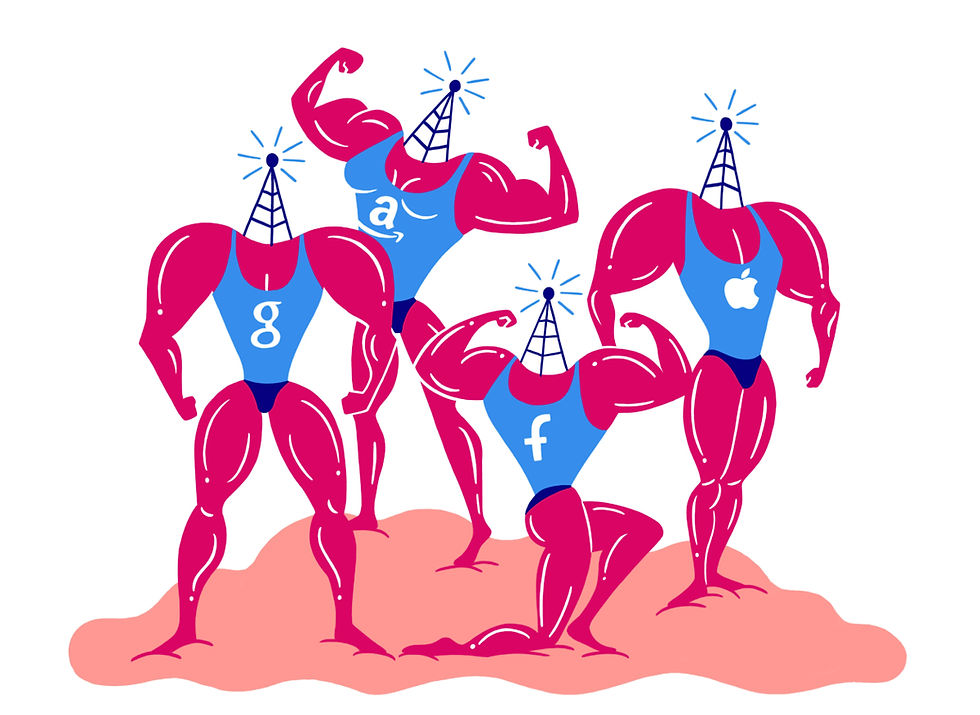Is Platform Capitalism Killing Liberal Democracy?
- Elizabeth Vleeskens

- Oct 1, 2021
- 3 min read
Updated: May 23, 2022
Are online platforms becoming too powerful? Are we losing our freedom?
To paraphrase John Philpot Curran (1750-1817): The price of liberty is eternal vigilance; which if broken, the consequence is eternal servitude.
Liberal democracies are relatively new, only forming in the last 250 – 300 years. Prior to the formation of Western democracies, with British Parliament (1707), United States of America independence (1776), and the French Third Republic (1870), around the world, we lived in systems that were, for the most, undemocratic. There have been many alternatives to liberal democracy and the (near) free market that the West has prospered from, Feudalism, Socialism, and Authoritarianism to name a few.
But there exist threats from within liberal democracies. Over the last four decades the West has changed (McCulley 2020), wealth is once again concentrated in the hands of a few. In 2018, the world's billionaires increased their wealth by $900bn or $2.5bn a day, whereas the poorest half of the world’s population, 3.8 billion people, became poorer – their wealth decreasing by 11% (Oxfam 2019).
Capitalism itself is undemocratic, McCulley (2020), describes capitalism’s ‘dark underbelly’, unravelling democracy from within, the two in perpetual fight.
The democratic system worked so well to educate the population, and elevated so many out of peasantry and servitude. Unlike democracy’s one-person one-vote system, capitalism has a cumulative voting system, where the more dollars someone has, the more votes they get (McCulley 2005).
Srnicek (2016), suggested this growing inequality of wealth is a function of Platform Capitalism – a new phase of capitalism, affecting all aspects of our lives and the foundations of democracy. The rise of Platform Capitalism, which Srnicek (2016) describes as online platforms, exemplified by Facebook, Apple, Amazon, Netflix, Google and Spotify (FAANGS), is perhaps one of the greatest homegrown threats to democracy.

Platform Capitalists are in essence uncompetitive, having more in common with monopolistic behaviour than Walrusian (Walrus (1874–1877) 2003) free markets and perfect competition (Modigliani and Miller 1958; Edward 2020; McCulley 2005). Platform Capitalists demonstrate authoritarian management by segmenting and outsourcing labour (Edward 2020). If left unchecked, Platform Capitalists will further undermine civil liberties and personal freedoms, putting increased pressure on democracy.
The last four decades have seen a pivot to power of capital over labour, immensely widening inequality (McCulley 2020). The world’s richest 26 individuals now possess the wealth of the poorest half of humanity (Oxfam 2019). Platform Capitalism is accelerating inequality. Under Platform Capitalism there is a fragmentation of labour, divided into core and peripheral workers (Thelen 2019 cited in Edward 2020). Core workers are paid well with excellent benefits, while peripheral workers are hired as freelancers so management can avoid contractual obligations and pay wages on a piece-meal basis to minimise cost of labour (Edward 2020). While the share of profits labour receives is diminished, company founders have become some of the world’s richest and most powerful people, often through monopolistic tools such as dual class shares (DCS) (Edward 2020).

Cant (2020, cited in Edward 2020) describes Platform Capitalism’s management style as authoritarian, where apps issue customer demands as commands. By design, there is information asymmetry between the workers and management (Ibid). Peripheral workers are deskilled, as objectives are neatly divided into observable, monitorable tasks (Edward 2020).
Workers' ability to take part in determining their rights and pay is diminished, with no room for negotiation within Platform apps (Gandini 2019 cited in Edward 2020; Edward 2020). The authoritarian nature of Platform Capitalism is not limited to interaction with workers – DCS allow founders to have authoritarian rule over the entire company (eg. Edward 2020; Wagner and Dwyer 2019). The prevalence of Platform Capitalist’s use of DCS means founders may own less shares, but have more votes, running their companies with little interference from other shareholders (Edward 2020; Wagner and Dwyer 2019).
Analysis of law shows that technology will not on its own lead to freedom and equal societies (Brancaccio 2019). Even if marginal cost becomes zero, because of “appropriation” and “enclosure” of collective knowledge by Platform Capitalists who, similar to colonialists, appropriated data produced by humanity, claiming ownership by enclosing it within their platforms (Brancaccio 2019). Platform Capital has essentially appropriated “the common” to extract wealth, and the only way to rectify this inequality is regulation through societies law on what can be private property and what is common property (Brancaccio 2019). Increased regulation of Platforms is the only way to curb unfavourable aspects and decrease market power. Perhaps best through government legislation breaking up the largest Platforms.
By Elizabeth Vleeskens - Master of Economics





Comments